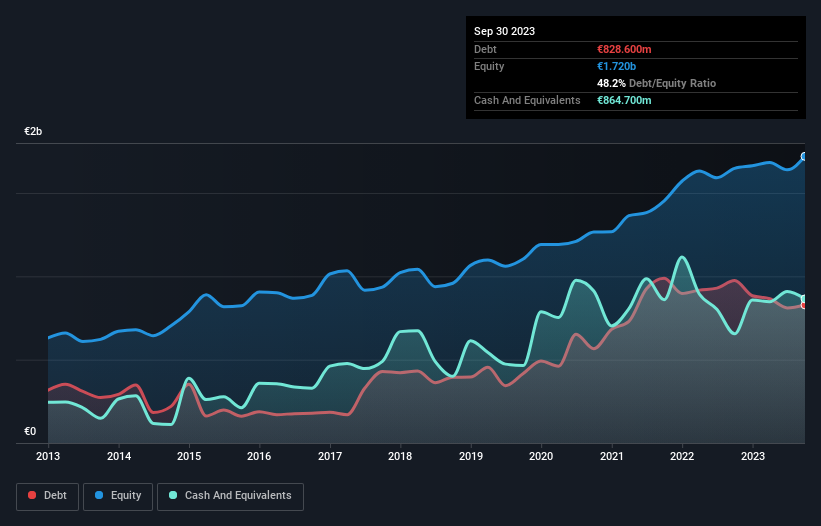
Warren Buffett famously said, 'Volatility is far from synonymous with risk.' When we think about how risky a company is, we always like to look at its use of debt, since debt overload can lead to ruin. We can see that De'Longhi S.p.A. (BIT:DLG) does use debt in its business. But the more important question is: how much risk is that debt creating?
What Risk Does Debt Bring?
Debt and other liabilities become risky for a business when it cannot easily fulfill those obligations, either with free cash flow or by raising capital at an attractive price. In the worst case scenario, a company can go bankrupt if it cannot pay its creditors. However, a more frequent (but still costly) occurrence is where a company must issue shares at bargain-basement prices, permanently diluting shareholders, just to shore up its balance sheet. Of course, debt can be an important tool in businesses, particularly capital heavy businesses. When we examine debt levels, we first consider both cash and debt levels, together.
Check out our latest analysis for De'Longhi
How Much Debt Does De'Longhi Carry?
The image below, which you can click on for greater detail, shows that De'Longhi had debt of €828.6m at the end of September 2023, a reduction from €974.7m over a year. However, its balance sheet shows it holds €864.7m in cash, so it actually has €36.1m net cash.

How Strong Is De'Longhi's Balance Sheet?
We can see from the most recent balance sheet that De'Longhi had liabilities of €1.09b falling due within a year, and liabilities of €802.8m due beyond that. Offsetting these obligations, it had cash of €864.7m as well as receivables valued at €460.8m due within 12 months. So its liabilities outweigh the sum of its cash and (near-term) receivables by €569.8m.
Of course, De'Longhi has a market capitalization of €4.25b, so these liabilities are probably manageable. However, we do think it is worth keeping an eye on its balance sheet strength, as it may change over time. While it does have liabilities worth noting, De'Longhi also has more cash than debt, so we're pretty confident it can manage its debt safely.
Another good sign is that De'Longhi has been able to increase its EBIT by 27% in twelve months, making it easier to pay down debt. When analysing debt levels, the balance sheet is the obvious place to start. But it is future earnings, more than anything, that will determine De'Longhi's ability to maintain a healthy balance sheet going forward. So if you're focused on the future you can check out this free report showing analyst profit forecasts.
Finally, a company can only pay off debt with cold hard cash, not accounting profits. While De'Longhi has net cash on its balance sheet, it's still worth taking a look at its ability to convert earnings before interest and tax (EBIT) to free cash flow, to help us understand how quickly it is building (or eroding) that cash balance. Over the last three years, De'Longhi recorded free cash flow worth a fulsome 83% of its EBIT, which is stronger than we'd usually expect. That puts it in a very strong position to pay down debt.
Summing Up
While De'Longhi does have more liabilities than liquid assets, it also has net cash of €36.1m. And it impressed us with free cash flow of €391m, being 83% of its EBIT. So we don't think De'Longhi's use of debt is risky. When analysing debt levels, the balance sheet is the obvious place to start. However, not all investment risk resides within the balance sheet - far from it. To that end, you should be aware of the 1 warning sign we've spotted with De'Longhi .
At the end of the day, it's often better to focus on companies that are free from net debt. You can access our special list of such companies (all with a track record of profit growth). It's free.
New: Manage All Your Stock Portfolios in One Place
We've created the ultimate portfolio companion for stock investors, and it's free.
• Connect an unlimited number of Portfolios and see your total in one currency
• Be alerted to new Warning Signs or Risks via email or mobile
• Track the Fair Value of your stocks
Have feedback on this article? Concerned about the content? Get in touch with us directly. Alternatively, email editorial-team (at) simplywallst.com.
This article by Simply Wall St is general in nature. We provide commentary based on historical data and analyst forecasts only using an unbiased methodology and our articles are not intended to be financial advice. It does not constitute a recommendation to buy or sell any stock, and does not take account of your objectives, or your financial situation. We aim to bring you long-term focused analysis driven by fundamental data. Note that our analysis may not factor in the latest price-sensitive company announcements or qualitative material. Simply Wall St has no position in any stocks mentioned.
About BIT:DLG
De'Longhi
Produces and distributes coffee machines, food preparation and cooking machines, air conditioning and heating, domestic cleaning and ironing, and home care products.
Flawless balance sheet, undervalued and pays a dividend.
Similar Companies
Market Insights
Community Narratives


